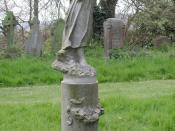Who is most responsible for the death of Eva Smith?
At the opening of the "Inspector Calls", the Birling family and Gerald Croft are enjoying a dinner to celebrate Shelia's engagement to Gerald. Arthur Birling, Shelia's father is particularly pleased, since the marriage should mean closer links with a rival company run by Gerald's Father. Gerald is optimistic about life in England - he sees peace and progress. After dinner, when the ladies leave the room, Birling lectures both his son and Gerald about "the importance of every man looking out for himself if he wants to get on in life". At this moment the door bell rings. They are not expecting a visitor. The maid announces that an inspector has arrived. Inspector Goole says that he is investigating the death of a young woman, Eva Smith. Birling is shown a photograph of Eva. He then remembers that he sacked her for leading a pay strike.
He feels justified in this action. The investigation moves to Shelia. Shelia also had Eva sacked as she took out her bad temper by complaining about Eva Smith to the manger of Milwards about her manner when served by her. Shelia regrets this. The inspector says Eva then changed her name to Daisy Renton. Gerald acts guilty. Gerald explains that he had an affair with Eva, but has not seen her since he ended it in autumn 1911. Shelia gives the engagement ring back to Gerald. The inspector turns his attentions to Mrs Birling, who confess that she also had contact with Eva, but not under that name. Eva, desperate and pregnant approached a charity where Mrs Birling was chairperson, to ask for help. Help was refused because Mrs Birling was offended by the girl calling herself 'Mrs Birling'. Mrs Birling, head of the charity tells Daisy Renton, "that the baby's father should be made entirely responsible". Eric is revealed as the father. He has stolen money from Birlings office to help Eva. Eric turns on his mother when he learns that she has refused to help. The inspector tells them they are all partly to blame for Eva's death and warns them of the consequences of people not being reasonable for each other. After the Inspector leaves, the family begin to suspect that the inspector was not a genuine police officer. A phone call to the Chief constable confirms this. They phone the infirmary to discover that no suicide case has been brought in that day. Arthur, Sybil and Gerald congratulate themselves, that it was all a hoax and that they can carry on as before, without a care in the world for people like Eva Smith. This attitude upsets Shelia and Eric. The phone rings, to inform them that a girl has just died by drinking disinfectant and a police officer is coming to question them.
Eva died as a result of drinking disinfectant. She drank the disinfectant of her own choice. She was depressed and was driven to drink disinfectant as she had suffered at the hands of the Birling family and was pregnant by Eric. She had no hope. The Birling family thought that as she was poor that she had no feelings and that the poor were emotionless; the poor are just there for the benefit of the Birlings. The Birlings are self centred people who only care about people like themselves. The inspector views the crime as a moral crime instead of an actual crime, what this means is the Eva Smith did not die by the Birlings killing her in his hands, but made her so mad that she was sick of her life that she killed herself to end all of the bad luck.
Priestly is trying to tell us through the play that no matter how rich or poor you are you should respect each other and threat each other fairly no matter what their position in life is. Priestly is also trying to tell us that, the rich should not use the weakness of the poor to their advantage; they are people not just some cheap labour. The play shows that the rich are also so selfish and self-centred toward the poor. For example Eva Smith, She went on a pay strike to get a little bit more money so she could buy the things she needed for example, cloths, food etc...
Eva Smith worked for Mr Birling in the, machine shop of the factory. She was a good worker, Eva and some other people went on a pay strike as they were not getting paid enough. Mr Birling found out that Eva was the leader of the strike, so he fired her. After Eva was sacked by Mr Birling, Eva had no job for four months, until she saw an advertisement which said, "Milwards recruiting". Eva got a job at Milwards as some of the assistants had come down with a virus. She enjoyed working there until she was fired for 'no reason'. Eva Smith then changed her name to Daisy Renton and turned to prostitution to earn money. One day as she was sitting in the Palace Bar, Gerald Croft comes to her. He takes her to an apartment that Gerald's is looking after for his friend while he is out of the country. Gerald put Eva into the apartment rent free for six months. After a while Gerald leaves Eva as he is engaged to Shelia. Eva got pick up by a man called Eric who made her pregnant. She found out that he stole money for her so she stopped seeing him. She then went to Mrs Birling's Charity; she introduced herself as Mrs Birling and Mrs Birling stood up and told her we cannot give you help you should go the father as it is his responsibility. So after getting denied help, she went home and wrote in her diary for the last time. She drank disinfectant and went to the infirmary and died. That was the end of her life of misery.
Mr Birling is an upper middle class man who has just come into new money, a successful factory owner, ex lord mayor of Brumley and a local magistrate. He regards himself as reasonable and pays his employees no more no less then the going rate. He feels that it is his duty to keep costs low and prices high. Birling has no imagination, and seems blind to the consequences of his actions, and to the events in the larger world. Birling likes to predict the future and talk rubbish for example, the unsinkable Titanic, "Unsinkable, absolutely unsinkable", this is an example of a dramatic irony, producing a different reaction in the audience from that in his intermediate listeners. The titanic could have also been a metaphor for the Birling own family and there positions, which seems unsinkable to them. Most of an iceberg is hidden below the surface of the water, just as the Birlings and the society - seediness is below a veneer of respectability. Birling is a self centred man who can not take responsibility. Mr Birling's involvement in the death of Eva Smith was that he fired her from his factory as Eva was the leader of a pay strike. When the inspector started to question Mr Birling he couldn't take responsibility for his action, but all he kept saying was that "I speak as a hard headed business man", this sums up how Mr Birling sees himself and also illustrates his pride. The audience also realise later that he is a hard - hearted man as well. Even through Mr Birling didn't kill her but he contributed to the death by starting it off, by victimising Eva Smith and starting the chain reaction.
Mrs Birling is more hard faced then her husband Mr Birling. She is introduced as his social superior and her manner indicates that she is very conscious of social position, especially her own. She is extremely arrogant and expects others to show her respect and prefers to her opinions and she resents being contradicted. When Mrs Birling is exposed to criticism, Mrs Birling retreats behind words like 'respectable', 'duty' and 'deserving'. She talks and tells Shelia many things but the one that stood out was, "Girls of that class", this shows us those Mrs Birling feelings of social and therefore moral superior. She does not attempt to understand an individual case on its own merits. The emphasis is on 'that' and shows how dismissive she is toward the working class. Mrs Birling involvement to the death of Eva Smith was that she was rejected by Mrs Birling's charity, purely because Eva used the name of Mrs Birling. When Eva went into the charity for help she told them that her name was Mrs Birling. Mrs Birling stood up and said "what do you mean", in an angry tone and embarrassment that she had used her name, rejecting Eva for help. Before she went she told her that, "go look for the father of the child, "It's his responsibility", in an angry tone. When she was questioned by the inspector she did own up and tell the inspector what she said and did. Mrs Birling did contribute a lot to Eva's death. By not helping her meant that she would not have been able to get a job being pregnant and that would have meant no money to live. Eva Smiths last hope was the charity but when she got turned down she committed suicide as she could not carry on.
Shelia Birling is the daughter of the Birling family. Shelia has an attractive and essentially honest character, and lacks the cold blooded attitude of her parents. Shelia says one thing that is very important that show us that she looks after her brother, she tells Eric "You're squiffy", this is a useful quotation because this show us the typical brother and sister relationship. Shelia's involvement is getting Eva fired from Milwards. Shelia went into the shop to try on some clothes, the assistant brought out the cloths to Shelia, and when she went into the dressing room and looked into the mirror, Shelia realised that the dress would look better on the pretty assistant then herself. This made her angry and imagined that the assistants were talk about her and laughing at her, which was not the case. Shelia went up to the manger and said, "If you don't fire that girl, I will get my mum to close the account with you". This was because she was in a bad temper all day. When the inspector comes to question her she owns up for everything, "So I'm really responsibly". Shelia contributed to Eva's death by firing her for no reason when she was at a good job earning money. She got her fired because she thought that Eva was victimising her.
Eric Birling is the son of the Birling family. During the play, Eric exposes himself as a drunk, and a father of an unborn child, a liar and a thief. In the first two acts Eric functions as an annoyance to his father, continually asking questions, that his father say that are silly. Eric involvement is getting Eva pregnant, stealing money to support her and lying to her. When Eric saw Eva/Daisy he started a relationship by using her as a prostitute. He used her and made her pregnant, he than gave money to Eva/Daisy. Eva after a while found out that the money was stolen. She refused to the money and stopped seeing him. Altogether he had stolen ã50. When Eric was questioned by the inspector, he owned up to, making Eva/Daisy pregnant, stealing the money from his father's office, and lying to her, which was everything. Eric was like Shelia responsible for his consequences. Eric contributed to Eva/Daisy by using her as a prostitute, making her pregnant and gave her stolen money which she did not except as it was stolen. This left her in a bad position as now she was having a baby.
Gerald Croft is an upper class fiancé of Shelia Birling, and the son of Arthur Birlings business rival, Sir George Croft. He agrees with the way Mr Birling handled Eva Smiths dismissal. Unlike Mr and Mrs Birling, when the news finally sinks in, it became clear that he helped Eva/Daisy. At the end of the play, Gerald shows the clearest head in thinking about the identity of the inspector and is the first to begin devising a way out. Gerald helped Eva out of her situation and did not take advantage of her in the violent and drunken way in which Eric did. Gerald put Eva/Daisy in to an apartment for six months free rent. Gerald did make Eva/Daisy genuinely happy for a time and in many ways to is least to blame for her death. When the inspector questions Gerald he owns up to everything that he did, he owned up to helping Eva and giving her some money so she could get back up onto her feet, but he has legitimate reasons for his actions. He didn't take advantage of her but just helped her. Gerald was the only one who did not contribute to her death as he helped and made Eva/Daisy happy. He told her it would be a short term relationship instead of misleading her.
In the 1912 everything that you did was on the status that you are in that area. Everything was reserved for the rich for example, jobs, schools, education, etc. If you were poor then it meant that you were nothing to the rich, they thought that the poor had no emotions or anything to live for apart from working for the rich, where as now things are different in many way. Everyone is treated as an equal for example, jobs, schools, education, etc. In today's society everyone has an equal chance of doing or following what he/she wants to do. We still do have the social ladder but is not that important anymore, what is important is that were you are in your job or your school. In jobs the higher the status you are the more respected you are and name you get for it, for example if you become a doctor your name will be Dr James instead of James. People will respect you for having that title. In today's world the poor are not just put to one side, but they are helped through benefits which is money given to the poor by the government to get back onto there feet. The that the play tells us is that no matter how rich or poor a person is you should always help them and treat them how you would want to be treated, not to be taken advantage of and used. Everyone is human, it doest mean if you are rich you are the best. The poor are just like the rich with feelings, emotions and self-respect.
When the inspector is about to leave, he apportion the blame to everyone by saying, "And my trouble is - that I haven't much time. You'll be able to divide responsibility between you when I have gone".
Before he leaves he says one thing that makes the family wonder, "But just remembers this. One Eva Smith has gone but there are millions and millions and millions of Eva Smith and John Smith still left with us, with their lives, their hopes and fears, their suffering chance of happiness, all intertwined with our lives, and what we think and say and do".
This makes the family wonder about how they could have stopped this from happening instead of it coming to this.
The inspector considers all of them to be responsible as they all played parts in Eva's life and death.
Before the inspector leaves he says one comment which gets the audience thinking, "We are members of one body. We are responsible for each other". The inspector's final speech presents the opposite view to the speech Mr Birling made when the door bell first rang. The message applies to everyone, even the audience.
At the end of the play the audience are a bit puzzled as there is a huge twist to the end. The audience find out that, that the inspector was there to warn them about the future and what was going to happen. Also the audience feel that how self centred the Birlings that they were not bothered about her death until it really sank in and that only two people owned up to what they did and only one person, Gerald helped her instead of using her. The audience go away intrigued with what happened and want to hear what will happen next. They also learn that no matter how rich or poor you are always help each other.
In my opinion I think that Shelia Birling and Mrs Birling are both to blame. Shelia got Eva fired from Milwards because she was having a 'bad day'. The assistants brought out a dress and thought it would look better on her, she also thought the two assistants were talking about her. So as result she went up to the manger to complain and said to him "if you do not fire her I will get my mother to close the account down with you". So Eva got fired.
On the other hand if Mrs Birling had helped her no matter what Eva said, that she was Mrs Birling, she could have been put into a flat and given her a bit of money to get back onto her feet. Instead Mrs Birling said to go and found the person that did this to you, this is for him to handle not us.
So in my eyes they are both to blame but I think that Mrs Birling is to blame for Eva's death, as a result of her nastiness.





